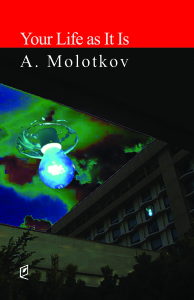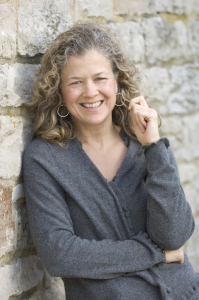 James Pfeiffer: Setting seems to be at the forefront of these poems, the opening sentences always grounding us in time and space. How is place important to your poetry or to your view of poetry in general?
James Pfeiffer: Setting seems to be at the forefront of these poems, the opening sentences always grounding us in time and space. How is place important to your poetry or to your view of poetry in general?
Anatoly Molotkov: As both a poet and a fiction writer, I have a special relationship with places, settings: I mistrust them. Since I was a kid, extensive descriptions and unnecessary specifics in literature have bothered me. My goal is to give the reader enough information to understand the text’s objectives without painting a complete (and therefore exhausting) picture. I’m more interested in a generic river than one with specific water and specific banks. I prefer a bridge to a brown steel bridge unless the two adjectives affect some essential result in the poem. Of course, the right detail is often key to unlocking the reader’s reaction. Under these circumstances, my use of detail is conservative and reluctant. In Your Life as It Is, the second person character seeks to inhabit a place between the page and the reader—I would hesitate to break the applicability of the narrative by providing details that are excessively specific. On the other hand, I often utilize recurring motifs—and in a work of this length they can be especially important. My generic places are among the recurring motifs.
Each of the pieces in this collection is what one might call a prose poem, but they aren’t the block texts which that moniker might imply—instead, there is a repeated four-stanza structure. Can you speak a bit about how that form developed as you were writing the collection?
The four sections on each page provide a frame for seeing the text and the world in general—four unchanging windows available to examine the ever-shifting set of four views. The issues and the terminology found in each section are skewed towards a particular set of concerns, creating a feel of four separate sub-narratives. This form emerged from the start, rather than through a retrospective reshaping. This approach seemed necessary to provide continuity, and consistent with the notion of life as a series of changing, but similar, days.
The pervading tone of the collection seems to me to be a tone of skepticism. There is a skepticism within the speakers about the ways in which they sense, experience, and think about the world. There is even a feeling of the poet being skeptical of his own conceits and movements within the poems. I found it quite energizing. For example, I’m thinking of all the questioning and challenging of vision and perception that takes place in just a few sentences like: “The little girl rides her bicycle by your front porch. The wheels are frozen, as if she is in a film. You realize you too may be in a film. You look around for a camera, but your own eyes are the camera and the source of light.”
Am I right to call this skepticism, or would you define it as something else? To what extent can that intense questioning be productive and to what extent can it be burdensome? What makes its presence so necessary in this collection?
AM: Skepticism is an applicable term, but uncertainty is a better fit for how I feel about it. Sure enough, thesaurus lists it as one of the synonyms for skepticism—but to me, the latter implies a colder, more secure position—a stance of viewing from aside. My second person character is much more embedded in a lack of understanding and the resultant insecurity. The character operates in a world whose rules are inscrutable, liable to change at any moment—indeed, even the core aspects of the character’s identity, such as gender, undergo a metamorphosis. And I would argue that it is the uncertainty lying in wait just steps away from the polished surfaces of our lives that causes our existential insecurities. We rub against this uncertainty in our self-definition. Whether intense questioning is productive for literature is a separate topic, very much dependent on the reader’s expectations and experience with text. Much of my writing contains overt rhetorical questions (those with a question mark at the end) —something I consciously avoided in “Your Life as It Is”. I often get criticized for the preponderance of questions in my work—just as often, I get complimented for the same trait. It’s up to each reader to decide which modes of literary evocation affect them correctly.
What do you hope readers will encounter in Your Life as It Is?
AM: It is difficult to formulate a recipe for my readers, with Your Life as It Is or any other work. The reader brings emotional and intellectual history to a literary text, and the final version of any text is the reaction created in the reader’s mind and heart. Thus, written text lives many lives. I rely on the readers to discover their own ways to interact with my texts. Just as writing is ultimately an intuitive process, so is reading. I’m reluctant to preempt that intuitive experience. In any case, I prefer to be the last person to understand my own work. I leave interpretive joys and responsibilities to the reader.
 Born in Russia, A. Molotkov moved to the US in 1990 and switched to writing in English in 1993. Published or accepted by The Kenyon Review, Mad Hatters Review, 2River, Perihelion, Word Riot, Identity Theory, Pif, and many more, Molotkov is winner of New Millennium Writings and Koeppel fiction contests, and a poetry chapbook contest for his True Stories from the Future. He co-edits The Inflectionist Review and serves on the Board of Directors of Oregon Poetry Association. Molotkov’s new translation of a Chekhov story was included by Knopf in their Everyman Series.
Born in Russia, A. Molotkov moved to the US in 1990 and switched to writing in English in 1993. Published or accepted by The Kenyon Review, Mad Hatters Review, 2River, Perihelion, Word Riot, Identity Theory, Pif, and many more, Molotkov is winner of New Millennium Writings and Koeppel fiction contests, and a poetry chapbook contest for his True Stories from the Future. He co-edits The Inflectionist Review and serves on the Board of Directors of Oregon Poetry Association. Molotkov’s new translation of a Chekhov story was included by Knopf in their Everyman Series.